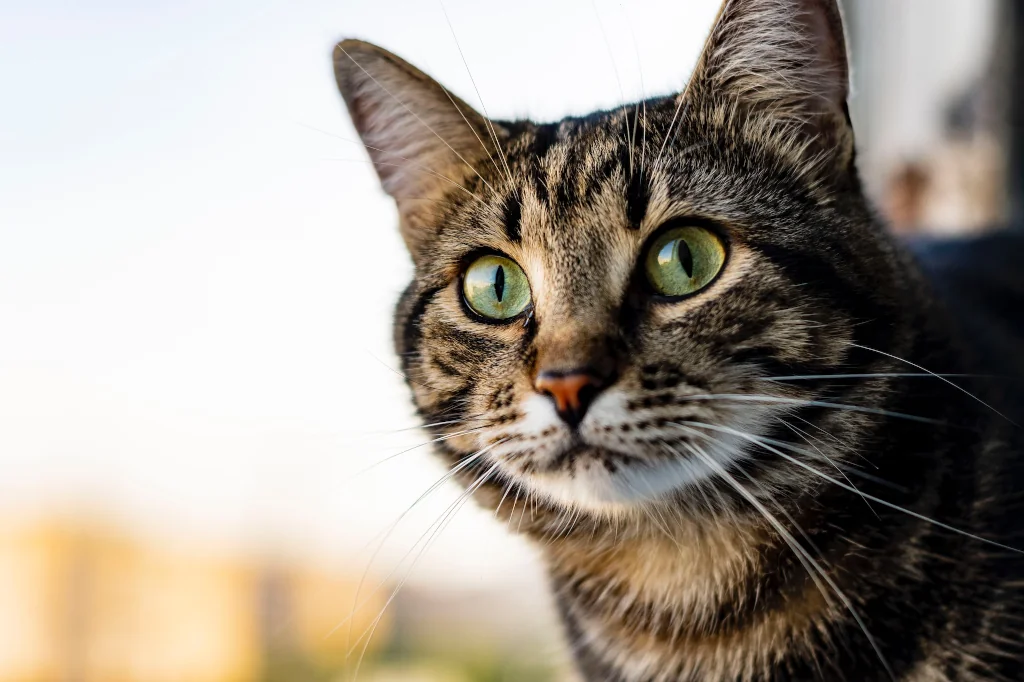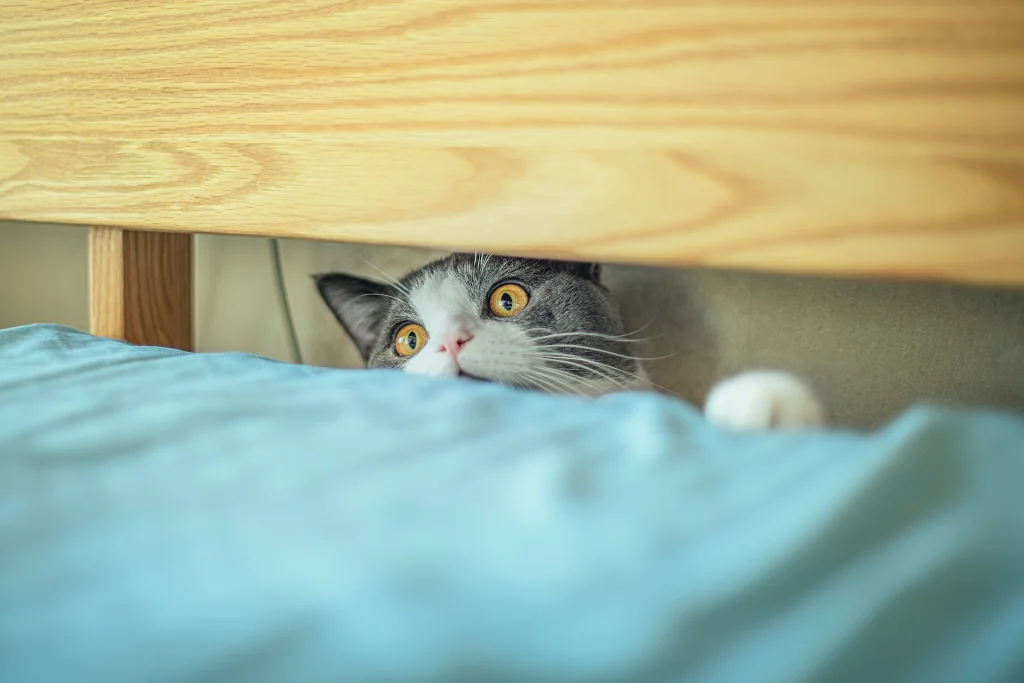Disclosure: We may earn a commission from helpful, relevant links in our content. No cost to you. See our privacy policy.
Has your feline friend been acting out whenever you’re away? Or perhaps you’ve noticed your normally independent kitty has become unusually clingy?
These could be signs your cat is suffering from separation anxiety. Unlike dogs, cats have a reputation for being solitary creatures. But believe it or not, our feline companions can experience separation anxiety too.
Let’s dive into the little-known world of feline separation anxiety and arm you with the knowledge to help your cat deal with this challenging condition.

Why Do Cats Develop Separation Anxiety?
Your cat’s temperament, upbringing, and daily routine all play a role in their susceptibility to separation anxiety.
Kittens separated from their mother too early, or adult cats who’ve undergone a major change like moving homes or losing a companion, are particularly vulnerable.
Cats, like people, crave stability. When their world feels unpredictable, it can lead to stress and anxiety. Even a seemingly small change, like a different feeding schedule or a new piece of furniture, can trigger anxiety in sensitive cats.
When you learn these triggers, you’ll be equipped to help your anxious feline. Now let’s take a look at the signs of separation anxiety in cats.
What Does Separation Anxiety Look Like in Cats?
Cats with separation anxiety may become excessively clingy and demand more attention than usual when you’re around.
When you’re away, they might show destructive behavior, excessive grooming, or even refuse to use their litter box. Unexplained weight changes and constant vocalizing can also be signs of distress.
It’s important to note that these behaviors may signal other health issues, too. If your cat is showing any of these signs, it’s worth having a conversation with your vet.
Remember, you’re your kitty’s best advocate. They’re counting on you to notice when things aren’t quite right.
What Can You Do to Help Your Anxious Kitty?
When it comes to comforting your anxious cat, consistency and patience are your greatest allies.
Start with a regular feeding and play schedule. Cats love predictability, and a set routine can bring a lot of comfort. Interactive toys that engage your cat’s hunting instincts can also help channel their anxiety when you’re not around.
Now, here’s a tip from our own experience. use your scent to comfort your cat when you’re away. Leaving a worn t-shirt or a pillowcase in your cat’s favorite spot can bring them a lot of comfort. Your scent can be a powerful calming influence, helping to reassure your cat of your return.
Another effective tool is calming sprays or diffusers. These products release synthetic feline facial pheromones, which can help to soothe anxious cats.
But remember, what works for one cat may not work for another. It’s all about finding what best helps your furry friend to relax.
Suggested read: Boost Cat Happiness with Enrichment

The Role of Environment in Easing Anxiety
Never underestimate the power of a cat-friendly environment in reducing your feline’s anxiety. Cats need spaces where they can retreat and feel safe. Providing multiple hiding places or elevated perches can make a world of difference to an anxious cat.
Here’s a little known yet effective tip. consider using ambient sounds to soothe your kitty. While it’s a well-known fact that music can have a calming effect on humans, studies have shown it can work for cats too. Playing soft classical music or nature sounds can help to soothe an anxious kitty.
Your cat’s sense of smell is also a potent tool for easing anxiety. Certain scents, such as lavender and valerian, can have a calming effect on cats. However, remember that a cat’s sense of smell is much stronger than ours, so use these scents sparingly.
It’s all about being observant and proactive, so don’t be afraid to try different things and see what works best for your furry friend.
When Should You Seek Professional Help?
There’s no doubt that managing a cat’s separation anxiety can be a challenge, and sometimes, despite our best efforts, they might need a little more help.
Look out for signs of persistent stress or anxiety, such as refusal to eat, aggressive behavior, or continuous vocalization even after trying all the calming techniques.
Remember, there’s no shame in reaching out for professional help. Your priority is your feline friend’s well-being, and sometimes that means calling in the experts.
As a responsible pet parent, don’t forget to monitor changes in your cat’s behavior. If things don’t seem right, reach out for professional help. Your furry friend would thank you if they could!
Quick Tips for Managing Feline Separation Anxiety
- Establish Routine. Maintain a consistent schedule for feeding and playtime.
- Provide Entertainment. Ensure access to interactive toys or stimulating windows for bird watching.
- Use Your Scent. Leave a piece of clothing with your scent where your cat likes to rest.
- Calming Products. Consider using calming sprays, diffusers, or pheromone-based products.
- Safe Spaces. Provide multiple hiding places or elevated perches for your cat.
- Soothing Sounds. Try playing soft classical music or nature sounds.
- Be Patient and Consistent. Changes won’t happen overnight. Be patient and consistent with your approach.
- Monitor Changes. Keep a close eye on your cat’s behavior and consult a professional if symptoms persist.
Remember, every cat is unique, so it’s all about finding the best combination that works for your feline friend.
Here’s some more insights from Jackson Galaxy on separation anxiety in cats:
FAQs
Can my cat’s diet affect their separation anxiety?
Your cat’s diet can indeed influence their separation anxiety. Dietary changes, particularly ones that increase the levels of tryptophan and B-vitamins, can positively impact a cat’s mood and reduce anxiety.
How can I tell if my cat has separation anxiety or is just bored?
Recognizing separation anxiety in your cat can be distinguished from boredom by observing their behavior when you’re away. For example, if your cat is excessively vocal, destructive, or eliminating outside the litter box only when you’re not around, it could be separation anxiety.
Does adopting another pet help alleviate my cat’s separation anxiety?
While adopting another pet could potentially provide companionship for your cat, it isn’t a guaranteed solution to alleviate separation anxiety. It greatly depends on your cat’s temperament and how they react to the new pet, and could potentially worsen the problem.
Are some cat breeds more prone to separation anxiety?
While any cat can develop separation anxiety, it’s more about the individual cat’s experiences and temperament than their breed. However, breeds known for their sociability and attachment to humans, such as Siamese or Maine Coon, might be more susceptible.
Alex, a passionate animal lover, has experience in training and understanding animal behavior. As a proud pet parent to two dogs and three cats, he founded AnimalReport.net to share insights from animal experts and expand his knowledge of the animal kingdom.




